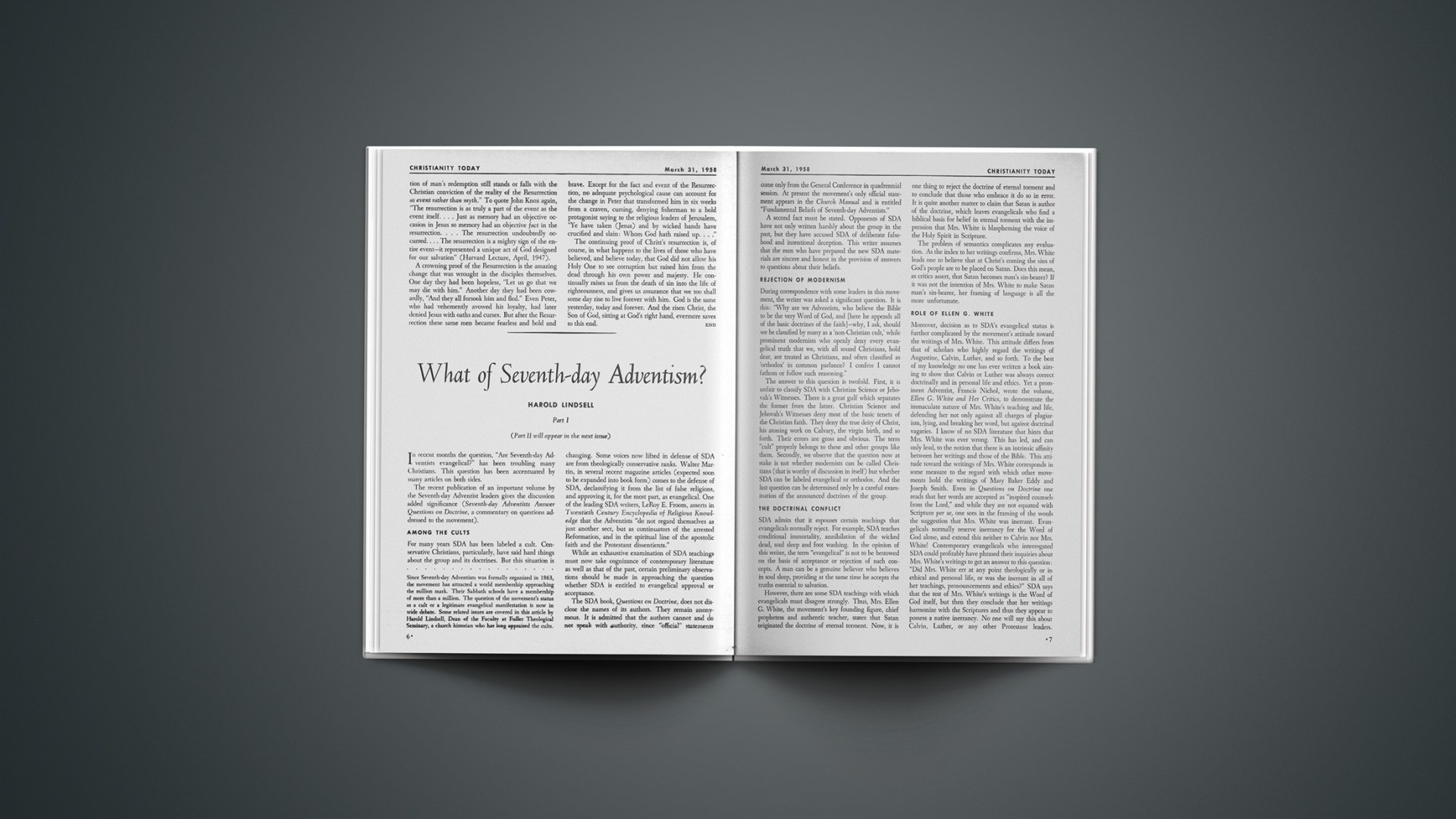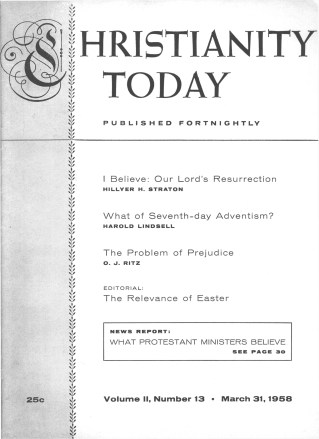(Part II will appear in the next issue)
In recent months the question, “Are Seventh-day Adventists evangelical?” has been troubling many Christians. This question has been accentuated by many articles on both sides.
The recent publication of an important volume by the Seventh-day Adventist leaders gives the discussion added significance (Seventh-day Adventists Answer Questions on Doctrine, a commentary on questions addressed to the movement).
Among The Cults
For many years SDA has been labeled a cult. Conservative Christians, particularly, have said hard things about the group and its doctrines. But this situation is changing. Some voices now lifted in defense of SDA are from theologically conservative ranks. Walter Martin, in several recent magazine articles (expected soon to be expanded into book form) comes to the defense of SDA, declassifying it from the list of false religions, and approving it, for the most part, as evangelical. One of the leading SDA writers, LeRoy E. Froom, asserts in Twentieth Century Encyclopedia of Religious Knowledge that the Adventists “do not regard themselves as just another sect, but as continuators of the arrested Reformation, and in the spiritual line of the apostolic faith and the Protestant dissentients.”
While an exhaustive examination of SDA teachings must now take cognizance of contemporary literature as well as that of the past, certain preliminary observations should be made in approaching the question whether SDA is entitled to evangelical approval or acceptance.
The SDA book, Questions on Doctrine, does not disclose the names of its authors. They remain anonymous. It is admitted that the authors cannot and do not speak with authority, since “official” statements come only from the General Conference in quadrennial session. At present the movement’s only official statement appears in the Church Manual and is entitled “Fundamental Beliefs of Seventh-day Adventists.”
A second fact must be stated. Opponents of SDA have not only written harshly about the group in the past, but they have accused SDA of deliberate falsehood and intentional deception. This writer assumes that the men who have prepared the new SDA materials are sincere and honest in the provision of answers to questions about their beliefs.
Rejection Of Modernism
During correspondence with some leaders in this movement, the writer was asked a significant question. It is this: “Why are we Adventists, who believe the Bible to be the very Word of God, and [here he appends all of the basic doctrines of the faith]—why, I ask, should we be classified by many as a ‘non-Christian cult,’ while prominent modernists who openly deny every evangelical truth that we, with all sound Christians, hold dear, are treated as Christians, and often classified as ‘orthodox’ in common parlance? I confess I cannot fathom or follow such reasoning.”
The answer to this question is twofold. First, it is unfair to classify SDA with Christian Science or Jehovah’s Witnesses. There is a great gulf which separates the former from the latter. Christian Science and Jehovah’s Witnesses deny most of the basic tenets of the Christian faith. They deny the true deity of Christ, his atoning work on Calvary, the virgin birth, and so forth. Their errors are gross and obvious. The term “cult” properly belongs to these and other groups like them. Secondly, we observe that the question now at stake is not whether modernists can be called Christians (that is worthy of discussion in itself) but whether SDA can be labeled evangelical or orthodox. And the last question can be determined only by a careful examination of the announced doctrines of the group.
The Doctrinal Conflict
SDA admits that it espouses certain teachings that evangelicals normally reject. For example, SDA teaches conditional immortality, annihilation of the wicked dead, soul sleep and foot washing. In the opinion of this writer, the term “evangelical” is not to be bestowed on the basis of acceptance or rejection of such concepts. A man can be a genuine believer who believes in soul sleep, providing at the same time he accepts the truths essential to salvation.
However, there are some SDA teachings with which evangelicals must disagree strongly. Thus, Mrs. Ellen G. White, the movement’s key founding figure, chief prophetess and authentic teacher, states that Satan originated the doctrine of eternal torment. Now, it is one thing to reject the doctrine of eternal torment and to conclude that those who embrace it do so in error. It is quite another matter to claim that Satan is author of the doctrine, which leaves evangelicals who find a biblical basis for belief in eternal torment with the impression that Mrs. White is blaspheming the voice of the Holy Spirit in Scripture.
The problem of semantics complicates any evaluation. As the index to her writings confirms, Mrs. White leads one to believe that at Christ’s coming the sins of God’s people are to be placed on Satan. Does this mean, as critics assert, that Satan becomes man’s sin-bearer? If it was not the intention of Mrs. White to make Satan man’s sin-bearer, her framing of language is all the more unfortunate.
Role Of Ellen G. White
Moreover, decision as to SDA’s evangelical status is further complicated by the movement’s attitude toward the writings of Mrs. White. This attitude differs from that of scholars who highly regard the writings of Augustine, Calvin, Luther, and so forth. To the best of my knowledge no one has ever written a book aiming to show that Calvin or Luther was always correct doctrinally and in personal life and ethics. Yet a prominent Adventist, Francis Nichol, wrote the volume, Ellen G. White and Her Critics, to demonstrate the immaculate nature of Mrs. White’s teaching and life, defending her not only against all charges of plagiarism, lying, and breaking her word, but against doctrinal vagaries. I know of no SDA literature that hints that Mrs. White was ever wrong. This has led, and can only lead, to the notion that there is an intrinsic affinity between her writings and those of the Bible. This attitude toward the writings of Mrs. White corresponds in some measure to the regard with which other movements hold the writings of Mary Baker Eddy and Joseph Smith. Even in Questions on Doctrine one reads that her words are accepted as “inspired counsels from the Lord,” and while they are not equated with Scripture per se, one sees in the framing of the words the suggestion that Mrs. White was inerrant. Evangelicals normally reserve inerrancy for the Word of God alone, and extend this neither to Calvin nor Mrs. White! Contemporary evangelicals who interrogated SDA could profitably have phrased their inquiries about Mrs. White’s writings to get an answer to this question: “Did Mrs. White err at any point theologically or in ethical and personal life, or was she inerrant in all of her teachings, pronouncements and ethics?” SDA says that the test of Mrs. White’s writings is the Word of God itself, but then they conclude that her writings harmonize with the Scriptures and thus they appear to possess a native inerrancy. No one will say this about Calvin, Luther, or any other Protestant leaders.
SDA claims its teachings are based upon the Bible. But an examination of its “Fundamental Beliefs” published in the volume Questions on Doctrine reveals some interesting exceptions. “Fundamental Beliefs” contain 22 propositions, beginning with a statement on the Scriptures and the Trinity, then moving through the gamut of theology. In each instance the biblical passages are listed at the end of each statement showing the grounds on which their convictions are founded. Without biblical backing, however, are statements 13, 14 and 15. These deal with one of the touchiest segments of SDA teaching—the 70 weeks and 2300 years and the cleansing of the sanctuary. The date 1844, which involves the 2300 years, and the cleansing of the sanctuary are pivotal to SDA faith. Destroy these and certain conclusions are self-evident. There would then be no adequate basis for the existence of SDA. But there are no definite statements in the Bible which support the views of SDA at this point. Their conclusions are derived from the teachings of Mrs. White, in turn, are the result of her interpretation of the Bible. Even this consideration, complex as it is, does not determine whether SDA is evangelical.
One acid test marks off Reformation theology from both sacramental theology and all other viewpoints. This has to do with soteriology. Framed another way it answers the question “How is a man saved?” Sacramental theology differs from Reformed theology in the sense that baptism becomes essential to salvation. This is true in Romanism. Unbaptized babies do not go to heaven, according to Romanism; they go to infant limbo. Romanism also teaches that salvation is the result of faith plus works. Reformed theology says salvation is by faith alone. One of the charges consistently leveled at SDA is that it teaches salvation by grace plus works. It is the charge of legalism. This charge relates both to the Sabbath question, deliberately unmentioned up to this point, and to the keeping of the other commandments. If SDA is involved in the Galatian error against which Paul wrote, then it is not evangelical. If, on the other hand, the charge of legalism is more academic and formal than real, then perhaps SDA will fall within the minimal orbit of evangelicalism. Is this charge of legalism one of language and semantics, or does it touch the structure of reality and mark off SDA from evangelicalism? To this question we shall address ourselves in the second installment of this article.
Since Seventh-day Adventism was formally organized in 1863, the movement has attracted a world membership approaching the million mark. Their Sabbath schools have a membership of more than a million. The question of the movement’s status as a cult or a legitimate evangelical manifestation is now in wide debate. Some related issues are covered in this article by Harold Lindsell, Dean of the Faculty at Fuller Theological Seminary, a church historian who has long appraised the cults.










